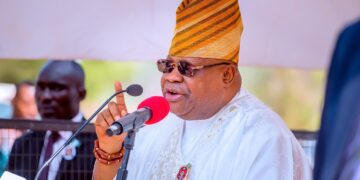By Kola Salami, Ede.
Global realignment of economic prosperity in a post COVID-19 world is gradually emerging as world renowned German luxury fashion house, Hugo Boss places first order with a Pakistani firm.
Countries with deliberate policies and leadership will benefit the most! Nigeria, are we ready?
That Nigeria is faced with huge infrastructural deficit is a fact that is indisputable; however, the extent to which this factor, in itself affects growth and economic development is debatable.
Many would argue that no industrialised country in history had achieved complete infrastructural development prior to achieving industrialisation; rather than being mutually exclusive, infrastructural development and industrialisation can be said to be complimentary in nature.
Relative to the state of our poor infrastructure; general productivity, creativity and efficiency is still abysmal.
Whilst farming remains our strongest competitive advantage, farmers often record relatively low yields compared to other countries around the world.
Notwithstanding our current infrastructural deficit, farsighted leadership and vision at various levels of government could facilitate transformation and contribute significantly to economic development.
With an expectation to bring between 20,000 and 100,000 hectares of new farmland under cultivation in every state of the federation; ‘Mass Agricultural Programme’ is top on the list of proposed key projects in Nigeria’s Economic Sustainability Plan in the post COVID-19 era. Second on the list is ‘Extensive Public Works and Road Construction’.
Out of the approved total of N2.3 trillion Nigeria Economic Sustainability Plan, agricultural projects that spans the entire agricultural value chain, from ‘farm to table’ is estimated to cost N634 billion.
Turning such long term vision, alongside short-and medium-term plans into effective action requires efficient and methodical public sector participation at the grassroots level. Competent and mission-oriented institutions such as the IITA must be leveraged to successfully implement the ambitious farming agendas.
In addition, capacity building and development amongst youths must be deliberate to fast track the re-invigoration of the value addition potential in farming. Efforts of federal and state governments would need to be complimented with extensive public sector participation at the grassroots level.
Ordinarily, having 62% of the Nigerian population below the age of 25 would have been a major strength. However, if not carefully managed, limited entrepreneurial, corporate and public work experience could easily turn this to a weakness rather than strength.
In Osun, at such defining moment such as this in our history, Governor Oyetola’s astuteness on creativity and inventiveness leaves one in no doubt that we are ready. The need however, for shared responsibility at the grassroots, in support of the state and federal governments can not be overemphasised.
All hands must therefore be on deck for the reconditioning of our minds for greater focus and attention to the things that matter – hard work and productivity across all levels of government.
Kolawole Salami
Ede South, State of Osun







